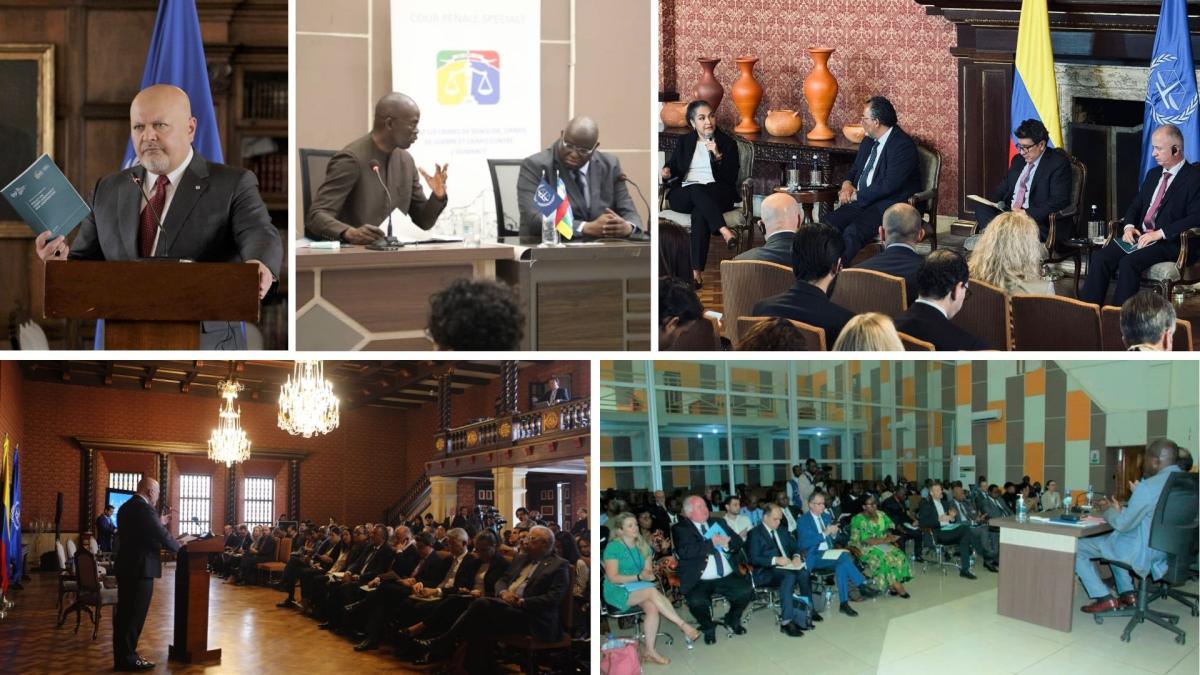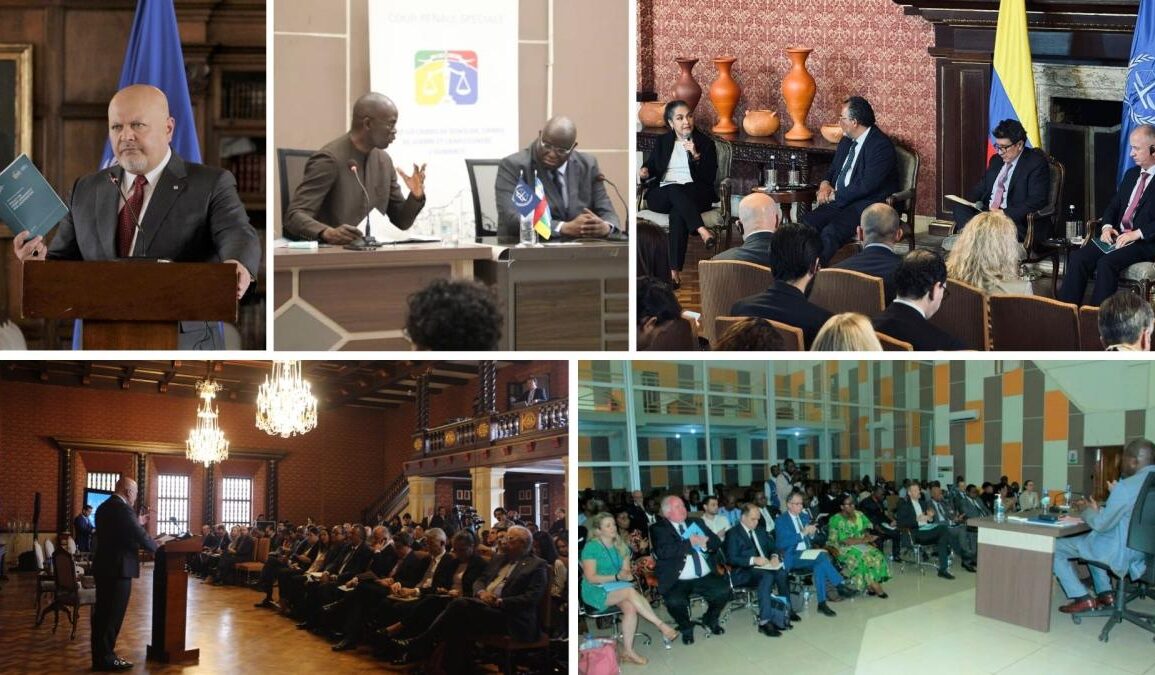
At events held in Bogotá, Colombia and Bangui, Central African Republic (CAR), the Office of the Prosecutor (OTP) of the International Criminal Court (ICC) launched today a new Policy on Complementarity and Cooperation.
The Policy presents a fundamentally renewed approach by the Office to the principles of complementarity and cooperation at the heart of the Rome Statute by bringing its work closer to affected communities and deepening its partnerships with States, civil society, and regional and international organisations.
At the event in Bogotá, ICC Prosecutor Karim A.A. Khan KC described the vision behind the renewed complementarity drive of his Office: “The ICC should be a hub at the centre of global accountability efforts, not considered as a detached apex of the international criminal justice system. By working together, by finding new ways of collaborating, we deliver better.”
The Prosecutor pointed to Colombia as one of major complementarity success stories of recent years, with significant progress in justice efforts through initiatives of the Special Jurisdiction for Peace (JEP), action by national authorities to advance accountability, and a vibrant civil society. The Office of the Prosecutor has engaged with the JEP extensively and provided support and training in thematic areas including gender persecution.
The event was jointly hosted by the OTP and the Government of Colombia represented by His Excellency, Mr Luis Gilberto Murillo, Acting Minister of Foreign Affairs of Colombia. Also joining the launch was the President of the Special Jurisdiction for Peace, Mr Roberto Carlos Vidal López, Special Adviser to the ICC Prosecutor on Complementarity, Prof. Rene Fernando Urueña Hernandez, Special Adviser to the ICC Prosecutor on Mutual Legal Assistance, Mr Yoshimitsu Yamauchi, Mr Carlos Ruiz Massieu, Special Representative of the Secretary-General for Colombia, Colombian senior national experts, and civil society representatives.
ICC Prosecutor Karim A.A. Khan KC and His Excellency, Mr Luis Gilberto Murillo, Acting Minister of Foreign Affairs of Colombia, launch the policy in Bogotá on 25 April 2024.
At the launch event in Bangui, ICC Deputy Prosecutor Mame Mandiaye Niang thanked CAR officials, and spoke of CAR as an example of the rising role of domestic authorities in addressing international crimes. “Our renewed policy on complementarity envisages the strengthening of a community of practice where we can learn from each other and highlight where the OTP is already actively cooperating with the Special Criminal Court (SCC) through sharing evidence and analysis in support of their proceedings, as well as expertise and best practices.”
The Deputy Prosecutor underlined that a partnership-centered approach offered the possibility of delivering more for victims, including through both the SCC and ordinary national courts in CAR, which investigate and prosecute international crimes committed in that country.
The event which was hosted by the SCC and opened by Mr Arnaud Djoubaye Abazene, Minister of State in Charge of Justice, Human Rights and Good Governance, provided a platform for discussion with local partners, including representatives from the SCC, national authorities, bilateral and multilateral partners such as the United Nations Multidimensional Integrated Stabilization Mission in the Central African Republic (MINUSCA), the United Nations Development Programme (UNDP), the European Union, the diplomatic corps, the CAR Bar Association, and civil society organisations.
ICC Deputy Prosecutor Mame Mandiaye Niang is welcomed by officials of the Special Criminal Court in CAR for the launch event in Bangui on 25 April 2024.
On the day of the launch, ICC Deputy Prosecutor Nazhat Shameem Khan was in Tunis, Tunisia, where she met with representatives of civil society organisations to discuss the Policy and the ongoing work on the situation in Libya. During her meeting, she emphasised that the OTP considers “civil society as an essential partner in our work and in delivering effective complementarity. With this new approach, we aim to deepen our engagement with victims and survivors and to strengthen our structured dialogue with civil society partners”. Deputy Prosecutor Khan also reiterated the OTP’s intention to enhance its complementarity work in the Middle East and North Africa region more broadly.
ICC Deputy Prosecutor Nazhat Shameem Khan was in Tunis, Tunisia to meet with civil society representatives on 25 April 2024.
The Policy on Complementarity and Cooperation, the first issued by the OTP on this area, distils a range of integrated measures intended to deliver a paradigm shift in the relationship between the Office, national authorities and other accountability mechanisms, and, crucially, the victims and survivors of atrocities globally.
The new policy underlines the Office’s commitment to deliver justice close to the affected communities, simultaneously focusing on delivering on the core investigative mandate of the OTP while increasing its ability to support efforts of other criminal jurisdictions and accountability actors.
The policy is a result of a global consultation process launched in October 2023 incorporating engagement with States parties, civil society, academic institutions, and affected communities.
To support the Policy’s implementation, the Office has established a dedicated Complementarity and Cooperation Trust Fund. Voluntary financial contributions to this Trust Fund will support complementarity activities, including the provision of information and assistance to national authorities in the implementation of their Rome Statute obligations, the establishment of a Complementarity and Cooperation Forum, and the development of new and deeper relationships with regional and international mechanisms and organisations, notably in support of accountability efforts in designated situations.
The Policy is also available in French and Spanish and translation into Arabic will be available shortly.
The Office extends its gratitude to the co-sponsors and hosts of the policy launch: Australia, Central African Republic, Colombia, France, Japan, Senegal, and Uganda.
More information
Policy on Complementarity and Cooperation
How the Court works: complementarity and cooperation
Complementarity: documents of the Assembly of States Parties to the Rome Statute
Office of the Prosecutor Strategic Plan 2023-2025
For further details on “preliminary examinations” and “situations and cases” before the Court, click here, and here.
This post was originally published on this site be sure to check out more of their content.









